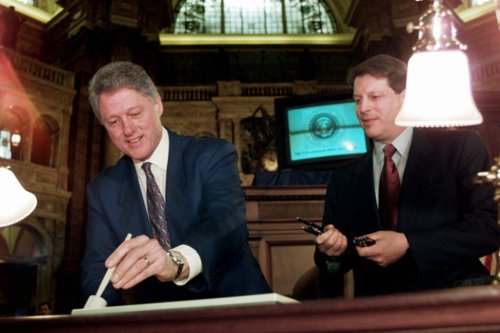 Kansas City Filmmaker Kevin McKinney originally released his movie “Corporate FM” in 2012, but unless you lived near a community that was screening the film or attended a film festival where it was being shown, you probably never saw it. Or even heard of it.
Kansas City Filmmaker Kevin McKinney originally released his movie “Corporate FM” in 2012, but unless you lived near a community that was screening the film or attended a film festival where it was being shown, you probably never saw it. Or even heard of it.
Amazon Prime
After re-editing the film in 2015 to reflect updates and changes in commercial radio since 2012, McKinney decided it was time to let more people access the information he covered in the film and just released it on Amazon Prime. (Here’s the LINK ) “Corporate FM” explores the consolidation of radio after the Telcom Act of 1996 and how big corporations with the help of Wall Street and private equity firms swallowed up the radio industry in America.
February 1996
I remember the day that President Bill Clinton signed the Telcom Act of 1996 into law.  It was supposed to provide competition between the phone companies and the cable companies with the goal to increase services and reduce prices to the consumer.
It was supposed to provide competition between the phone companies and the cable companies with the goal to increase services and reduce prices to the consumer.
Inserted into the bill at the 11th hour were two paragraphs that would change the radio industry forever.
In the film, Robert McChesney, Professor of Communication Studies, University of Illinois points out that commercial media lobbyists, without a single public hearing or any public debate, would insert these paragraphs and open up the consolidation floodgates for radio/TV. Politicians would later say they didn’t know what they were voting for. Even President Clinton would say that he didn’t know that those two paragraphs had been added before he signed the bill into law.
Cumulus and Clear Channel
As the McKinney film told the story of the rise of Cumulus and Clear Channel, it reminded me of my time with both of those companies.
In Waterloo, Iowa I was running the #1, #2 and #3 radio stations. When Cumulus took them over, John Dickey showed up at the stations and proceeded to tell all of us gathered in the station’s conference room what our new logos would look like, what our new jingle packages would sound like, who our new station voice guys would be, how our playlist would be compiled, who are new consultants were etc. To say we were all stunned would be an understatement.
Then later when I was working for Clear Channel (after the Bain/Lee takeover, but before it became iHeartMedia) in Sussex, New Jersey, we received a survey from corporate asking us how local decisions were made about branding, marketing, promotions, music and the like. I assume a similar survey was sent to every market cluster inside Clear Channel.
When the results were tabulated at HQ, we then received directives that no longer would those types of decisions be made on the local level. Local radio had changed.
Local Bands
Growing up, local radio was a way for local bands to get exposure and grow their audience. “Corporate FM” tells the story of how Jewel became a national artist being discovered by local radio and played on-the-air in San Diego.
In fact, it was seeing a drop in attendance at live shows that got McKinney to wondering what was happening, and giving birth to his movie about the consolidation/corporatization of the radio industry.
I know a local band here in Winchester, Virginia “Sons of Liberty.” They play all over the Shenandoah Valley and beyond. They have a CD that Rob McKenzie of Fireworks Magazine spoke glowingly about. Where you won’t hear the “Sons of Liberty” music is on the radio.
Oh, they’ve been heard on an FM radio station (98 Rock) out of Harrisonburg, Virginia on their Sunday night “Wet Paint” show that starts at 11pm. But as “Corporate FM” points out it takes repetition to have an audience become familiar with anything, and for someone to decide they like it, or don’t. Radio used to provide that type of exposure and then monitor audience reaction to see if the record was a hit or a miss. (Remember features like “Champ & Challenger?”)
Sneak Preview
ABC Radio Networks used to air a feature hosted by WABC’s Chuck Leonard called “Sneak Preview.” The network would call affiliates of the ABC Contemporary Radio Network to get their hottest new song and then play it to a nationwide audience. I remember being at WBEC in Pittsfield, Massachusetts when we told Chuck that our hottest new song was “Tracy by The Cufflinks.” He told us he had a terrible time trying to find a copy of the song in New York City. But Chuck Leonard did find it and it played over the ABC network to a national audience. That was how radio made the hits.
Fifty to Six
“Corporate FM” tells how in the 80s ninety percent of mass media in America was owned and controlled by about fifty different companies, but after the Telcom Act of 1996 it was down to just six corporations.
“Most radio studios are completely empty after 7pm and for the entire weekend.
They set the phone lines to “busy” so callers will believe that someone is there.”
-Slide shown in film
Big N Rich
The popular country recording artists “Big N Rich” addressed the FCC in Memphis, Tennessee. They told the commissioners that one person in a corporate office today can dictate what 35, 55, or 100 stations play.
“Let’s say an artist puts out a song with a political viewpoint and that corporate person says I don’t believe in that position so we’re not going to play that record (Dixie Chicks?). One guy can affect what 30 million people get to hear.
That’s censorship.”
-John Rich
Fatherly Advice
Dick Fatherly says “the broadcasters have become the victims, and the winners are – who do you think? -Goldman Sachs.”
Josh Kosman, who wrote the book “The Buyout of America” put it this way: “Private equity took the radio business that was doing pretty well and gutted it.”
Josh has studied how private equity has impacted all industries in America. He used a simple example to explain the difference between you or I buying a house and a private equity firm buying a business doing a leverage buyout (LBO).
When we buy a house, we put down say 30% as a down payment and then take out a mortgage for the 70% balance.
When private equity buys a radio station, they make a small down payment and then the radio station they’re buying takes on the debt for the balance, leaving the radio station with crushing new debt.
The private equity companies then charge management and other fees, making back their down payment money, and a whole lot more. So, it’s zero risk to them.
It reminds me of the guys on the Atlantic City Boardwalk who used to entice you to let them guess your weight and if they got it wrong you won a prize. The only way those guys lost is if you didn’t pay them to guess your weight. For if they got your weight right, they gave you nothing and if they got your weight wrong, they gave you a prize that was valued less than what you paid them to play the game.
“Financial deals allow the corporate owners to keep their stations after bankruptcy.
This prevents local owners from reviving local radio.”
-Slide shown in the film
For those who hold out hope that if/when the big corporate entities fail, and it will return radio to local operators once more, that slide should send a chill down your spine.
America’s bankruptcy laws now favor the debtor in the corporate world.
Conclusion
This is probably a film that many will miss and that’s unfortunate. It’s only a little over an hour in length. It’s well worth your time.
For this is a film not just about what happened to the radio industry but what is happening to our way of life, in industry after industry. This modus operandi is being repeated today.
The people in the film offer their ideas for making radio great again.
I won’t spoil that for you, so you’ll have to watch the film.
Some of the statements made by various participants have since been proven wrong from the time the film was shot. Some of the statements are also inaccurate in terms of how today’s FCC license renewals can be challenged.
In all fairness, many people are still believing that the way it was, is the way it still is. Only it isn’t. Those laws have been changed by corporate lobbyists too.
I hope you will watch the film “Corporate FM” and then post your comments here on DickTaylorBlog dot com.
Note: Don’t have Amazon Prime, you can rent this movie for $2.99
